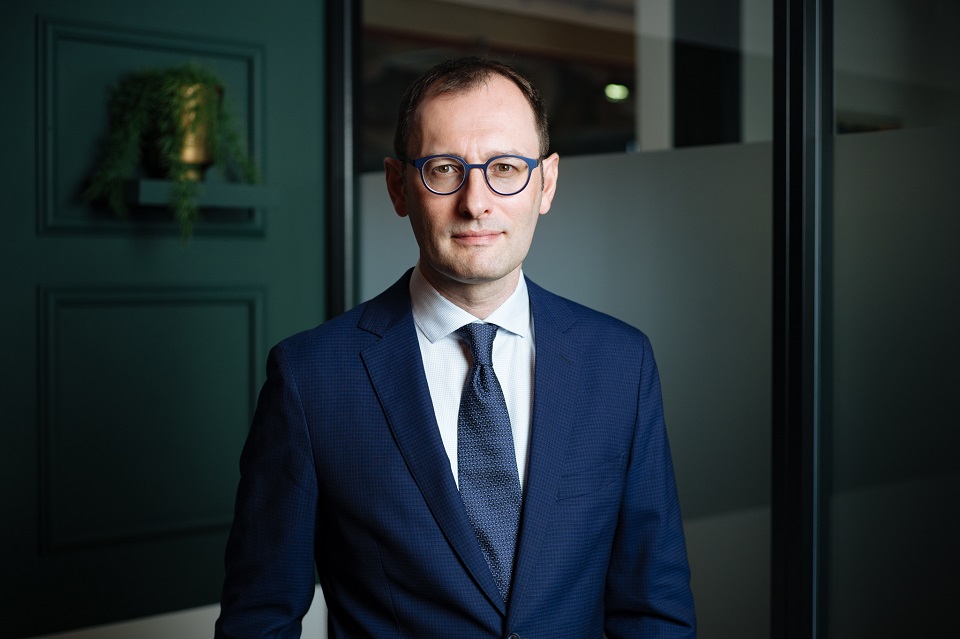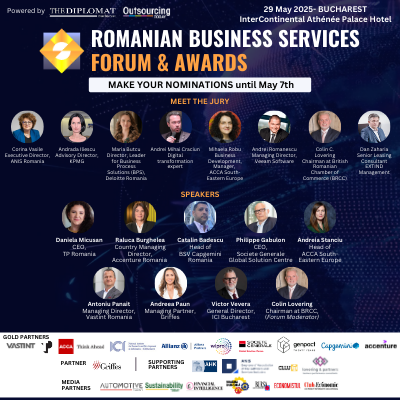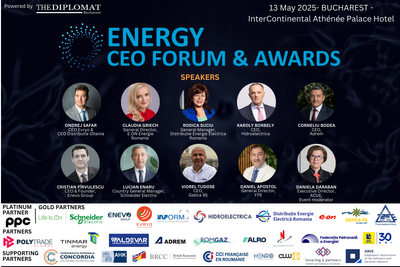Forvis Mazars: Growing competition and economic uncertainty impact Romanian and CEE C-suite strategies, keeping organic growth as the core business driver

• 36% of C-suite executives from Romania and 38% from CEE identified increased competition as the main factor most likely to hold back growth
• Increased competition is also the top external trend that will have the biggest impact on businesses in both Romania and CEE
• Sustainability strategy is a major priority in Romania, followed by international expansion and IT transformation
Forvis Mazars Group, the international audit, tax and advisory services partnership, recently revealed the results of its latest C-suite barometer. The 2025 study, which captures the views of over 1,700 C-suite executives across more than 35 countries and territories, found that the majority (93%) of C-suite executives worldwide have a positive growth outlook for their organisations, but there are still challenges ahead. Results show a significant increase in competition and geopolitical instability worldwide, as the highest rising trends impacting organisations and likely to hold back growth.
On a regional level, the barometer looks into the outlook of 250 C-suite executives from Central and Eastern European (CEE) to assess the context. CEE leaders remain optimistic, with nine in ten executives having a strong growth outlook for their business in 2025.
However, C-suite leaders in CEE identify increased competition (38%), economic uncertainty (32%), and energy prices (31%) as the factors most likely to hold back growth, a sentiment shared by executives globally. These factors are also expected to bring on challenges this year.
While leaders remain committed to addressing these trends expected to impact their businesses in the long run, organic growth (35%) remains the most important source of growth for organisations in the region, followed by private equity (32%), a new factor compared to the previous year, and strategic alliances/joint ventures (21%).
“It’s inspiring to witness the dedication and optimism of leaders as they tackle major trends impacting their businesses. While organic growth (35%) remains the primary driver for organisations in the region, the complexities and conflicts in global markets suggest it might not suffice for their growth ambitions. Consequently, businesses are increasingly turning to private equity (32%) and strategic alliances/joint ventures (21%) to stay competitive. Interestingly, there are some areas that present a different view of the business landscape, highlighting potential obstacles to long-term growth and expansion.”, mentioned Milan Prokopius, CEE Regional Chair, Forvis Mazars in CEE & Central Asia.
Top strategic priorities for the next three to five years
• Transforming company IT and technology is the top strategic priority overall for a third of the surveyed executives (33%), with a point increase in CEE over the past 12 months, alongside other global C-suite leaders (43%).
• International expansion closely follows in CEE (30%), maintaining a steady level compared to the previous year.
• Sustainability strategy emerges as the third top priority, with great potential to redefine organisations, selected by 28%, growing by eight points since the same period in 2024.
The most important digital transformation priorities for executives in CEE are efficiency and productivity (50%), close to the global rate of 55%, and security (46%), which is four points above the global outlook. Aligning with other C-suite leaders globally (37%), risk management is also very important in the region (43%).
The rush to adopt the latest tech trends seems to have slowed down. When it comes to artificial intelligence, only one-third of executives in CEE believe generative AI will have a major impact on their organisation. This is down nine points from 2024 and 15 points below the global average.
Investment in international expansion
C-suite executives keep international expansion as a top strategic priority. A quarter of leaders around the world and eight in ten CEE businesses (85%) are planning to expand internationally to at least one new country in the next five years. The top destinations targeted by businesses in CEE for expansion are Germany, the USA, Austria, and Hungary.
Talent in the spotlight
As over half (54%) of executives report a difficulty with hiring talent into their organisation, C-suite leaders in CEE may have overlooked the importance of tackling the scarcity of talent as part of the strategic priorities, especially if international expansion is at the top of their agenda.
New or revised talent strategies don’t appear in the top five priorities of leaders, however, adding to the increasing pressure of the talent challenge, up 13 points compared to 2024.
Recruiting challenges for companies in CEE are reported primarily at the graduate, early career, and intermediate levels. Regionally, executives have less difficulty hiring senior-level employees than other C-suites globally.
Hybrid working policies are currently a lower priority in CEE (26%) than globally (39%). For organisations in the region with hybrid working models, the key goal is full flexibility.
90% of the Romanian C-suite leaders have a positive outlook for growth in 2025
Despite this optimism, Romanian executives remain keenly aware of the challenges that could hinder progress. The most pressing concerns threatening growth include increased competition (36%), new regulations (28%), and political tensions or instability (28%). These concerns reflect a sharper focus on political and regulatory issues than in many other CEE markets, reinforcing the importance of adaptability and strategic foresight in Romania’s business leadership.
In addition to these internal challenges, external trends are also poised to shape the business landscape. Increased competition (48%) is the top external factor likely to impact businesses in 2025, followed by economic (36%) and energy trends (34%), which are also significant considerations.
This marks a shift from 2023 when Romanian executives identified energy prices and shortages (61%) as the top concern. Today, however, while energy remains a significant factor, it is the rising competition that takes center stage, a trend also highlighted at the CEE and global levels.
In Romania, the top strategic priorities are centered around sustainability, international expansion, and IT transformation. A significant 46% of businesses prioritise sustainability strategies, recognising the growing importance of environmental responsibility. International expansion follows closely, with 32% of companies focusing on expanding their reach beyond Romania. Meanwhile, 28% of businesses are dedicated to transforming their IT infrastructure, aiming to enhance efficiency and innovation in a rapidly evolving digital landscape.
Sustainability stands as the top strategic priority for Romanian C-suite leaders
In 2025, 46% of Romanian businesses prioritise sustainability strategies – higher than the CEE average (42%) but slightly below the global level (53%). Half (50%) of companies in Romania publish a sustainability report, and 76% of those reports are integrated with financial reporting.
Regarding readiness, 40% say they are “completely ready” to comply with sustainability reporting regulations, while 44% are “mostly ready.” The Global Reporting Initiative (GRI) is the most influential framework guiding these reports.
Key topics featured in Romanian sustainability reports include climate and carbon emissions (60%), circular economy (52%), and human rights (50%). The main challenges cited are understanding regulations (56%) and finding the right service provider (40%).
Romanian companies look abroad for future growth
While 32% of Romanian businesses identify international expansion as a strategic priority, a significant 82% of executives say their company plans to enter at least one new country within the next five years.
Germany is the top destination for expansion (12%), followed by Hungary, Italy, the Netherlands, Switzerland, and the US (each at 7%).
The main challenges businesses face when expanding abroad include securing a local workforce (59%) and understanding local regulations (54%). Establishing local supply chains and localising products or services are also key concerns, cited by 44% of respondents.
Dino Ebneter, Country Managing Partner, Forvis Mazars in Romania, mentioned: “International expansion continues to stand out as one of the top strategic priorities for Romanian companies. What’s encouraging is the long-term vision – most companies aren’t just reacting to market pressures, but actively planning for cross-border growth. Romania’s location, access to the EU market, and increasingly skilled workforce provide a solid foundation for businesses looking to expand internationally. The next step is turning ambition into action, supported by local insight, cultural adaptability, and strategic planning.”
For the past five years, transformation of IT and technology has been a top priority for Romanian businesses
In Romania, 68% of C-suite leaders already have a strategy for transforming their company through technology. Of these, 54% have a strategy for generative AI, and 44% for discriminative AI, positioning Romania on par with other CEE countries, though slightly behind the global average.
Despite this, 80% of leaders are confident in the ROI of digital transformation, with similar confidence for generative AI (76%) and somewhat less for discriminative AI (62%). The top priority for digital transformation is improving efficiency and productivity (54%).
The main barrier to success is cost/limited budget (44%), followed by the speed/complexity of implementation (42%) and security/regulatory compliance concerns (42%).
AI is seen as impactful by 86% of executives, with 34% predicting a “major” impact and 52% a “minor” impact. Currently, 70% are using AI for internal processes and 64% for commercial products/services. The main goals for deploying AI include operational excellence (28%) and growth initiatives (23%).
However, ethical concerns remain: 80% of C-suite leaders express some level of concern about AI, with 33% identifying these concerns as “major.” Additionally, 60% believe AI regulation is either “essential” or “very important.”
About the study
The C-suite barometer: outlook 2025 examines the views, challenges, and strategic priorities of today’s C-suite leaders around the world. This independent research was conducted between 28 September and 23 October 2024 and captures the views of 1,706 C-suite leaders at for-profit organisations with annual revenues of over $1million across more than 35 countries.















